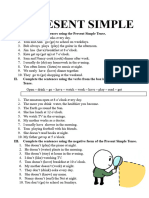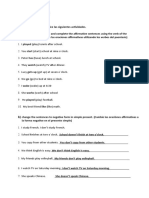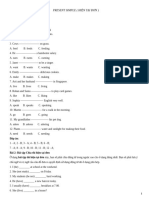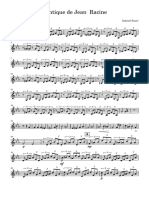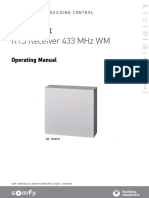0 ratings0% found this document useful (0 votes)
50 viewsPresent Simple Tense
Present Simple Tense
Uploaded by
Nicolay JaramilloThe document contains examples of verb conjugations in the present simple tense, including:
1) 10 sentences completing verbs in affirmative sentences.
2) 10 negative sentences changing the verbs.
3) 10 questions using "do" or "does" to form questions.
The document provides modeling of verb conjugations for students to practice forming sentences in the present simple tense in English. It includes examples of affirmative and negative sentences as well as questions.
Copyright:
© All Rights Reserved
Available Formats
Download as PDF, TXT or read online from Scribd
Present Simple Tense
Present Simple Tense
Uploaded by
Nicolay Jaramillo0 ratings0% found this document useful (0 votes)
50 views2 pagesThe document contains examples of verb conjugations in the present simple tense, including:
1) 10 sentences completing verbs in affirmative sentences.
2) 10 negative sentences changing the verbs.
3) 10 questions using "do" or "does" to form questions.
The document provides modeling of verb conjugations for students to practice forming sentences in the present simple tense in English. It includes examples of affirmative and negative sentences as well as questions.
Original Title
Present simple tense
Copyright
© © All Rights Reserved
Available Formats
PDF, TXT or read online from Scribd
Share this document
Did you find this document useful?
Is this content inappropriate?
The document contains examples of verb conjugations in the present simple tense, including:
1) 10 sentences completing verbs in affirmative sentences.
2) 10 negative sentences changing the verbs.
3) 10 questions using "do" or "does" to form questions.
The document provides modeling of verb conjugations for students to practice forming sentences in the present simple tense in English. It includes examples of affirmative and negative sentences as well as questions.
Copyright:
© All Rights Reserved
Available Formats
Download as PDF, TXT or read online from Scribd
Download as pdf or txt
0 ratings0% found this document useful (0 votes)
50 views2 pagesPresent Simple Tense
Present Simple Tense
Uploaded by
Nicolay JaramilloThe document contains examples of verb conjugations in the present simple tense, including:
1) 10 sentences completing verbs in affirmative sentences.
2) 10 negative sentences changing the verbs.
3) 10 questions using "do" or "does" to form questions.
The document provides modeling of verb conjugations for students to practice forming sentences in the present simple tense in English. It includes examples of affirmative and negative sentences as well as questions.
Copyright:
© All Rights Reserved
Available Formats
Download as PDF, TXT or read online from Scribd
Download as pdf or txt
You are on page 1of 2
ESPOCH Macas ZOOTECNIA 1
English
Present simple tense
COMPLETE THE VERB IN AFFIRMATIVE SENTENCES
EXAMPLE:
I ___GO_____ (go) shopping with my brother.
1. We sometimes _use__ (use) a dictionary in class.
2. My friend _studies__ (study) Italian at their school.
3. School __finishes______ (finish) at three o´clock.
4. You _live____ (live) near me.
5. He __likes___(like) rap music.
6. She __does___ (do) her homework before dinner.
7. We ___play__ (play) tennis in school on Wednesday afternoon.
8. I __watch___ (watch) TV in the evening.
9. My mother __teaches___ (teach) art.
10. My mother __washes__ (wash) the dishes.
WRITE NEGATIVE SENTENCES
EXAMPLE:
I study French. _____________Negative: I don´t study French.
1. School finishes at two o´clock. School doesn’t finishes at two o’ clock.
2. You copy from other student. You don’t copy from other student.
3. We think English is easy. We don’t think English is easy.
4. My friends play volleyball. My friends don’t play volleyball.
5. I watch TV on Saturday morning. I don’t watch TV on Saturday morning.
6. She speaks Chinese. She doesn’t speaks Chinese.
7. The dog likes cats. The dog doesn’t likes cats.
8. They listen to pop music. They don’t listen to pop music.
9. I play with my hamster every day. I don’t play with my hamster every day.
10. He study biology. He doesn’t study biology.
Name: Nicolay Jaramillo 1 Date: 10/06/2017
ESPOCH Macas ZOOTECNIA 1
English
MAKE QUESTIONS USING (DO) OR (DOES).
EXAMPLE:
(Where/she/live) ____________Where does she live?
1.(When/you/play/soccer) _When do you play soccer?
2.(What/he/eat/for/lunch) _What does he eat for lunch___?
3.(When/they/come/home/from/school)_When do they come home from school_?
4.(she/want/to/work/Where) __Where does she want to work__?
5.(When/your/mother/take/you/to/school) When does your mother take you to school _?
6.(What/time/you/get/up)___What time do you get up____?
7.(Where/your/father/work) _____Where does your father work_____?
8.(Julia/live/Where) ___Where does Julia live____________?
9.(How/Juan/and/David/go/to/school)_____How do Juan and David go to school________?
10. ( What/you/ do/do) _____What do you do___________?
Name: Nicolay Jaramillo 2 Date: 10/06/2017
You might also like
- Night and Day - Joe PassDocument6 pagesNight and Day - Joe PassFrancesco Fabiani100% (3)
- 365 Stories For Bedtime (Schwager Steinlein) (Z-Library)Document208 pages365 Stories For Bedtime (Schwager Steinlein) (Z-Library)emailerNo ratings yet
- The Filipino Art and Crafts: Maboloc. Quiriquiol. Magno. Macion. MailwasDocument85 pagesThe Filipino Art and Crafts: Maboloc. Quiriquiol. Magno. Macion. MailwasAriel MolinaNo ratings yet
- Institución Educativa Técnica Agropecuaria de Ricaurte English 9Th Grade Simple Present Tense WorkshopDocument1 pageInstitución Educativa Técnica Agropecuaria de Ricaurte English 9Th Grade Simple Present Tense WorkshopMarcoNo ratings yet
- CHUYÊN ĐỀ 1Document19 pagesCHUYÊN ĐỀ 1nghahannieNo ratings yet
- Present Simple (1) SolutionDocument2 pagesPresent Simple (1) Solutionjesicapaolaherrera530No ratings yet
- Answer The Following Question With Present Tense Form Rule.: Do You Work Every Day? (Work)Document3 pagesAnswer The Following Question With Present Tense Form Rule.: Do You Work Every Day? (Work)wildanNo ratings yet
- 5 WorksheetsDocument2 pages5 WorksheetsRosina MarinNo ratings yet
- Speaking Lab 2Document20 pagesSpeaking Lab 2Yeimy HernándezNo ratings yet
- Present Simple: Affirmative, Negative, QuestionsDocument4 pagesPresent Simple: Affirmative, Negative, QuestionsRuthVerónicaDelgadoVeraNo ratings yet
- Revision Complete These Exercises and Then Check The Answers (Use The Dictionary If Needed)Document12 pagesRevision Complete These Exercises and Then Check The Answers (Use The Dictionary If Needed)Montse López LópezNo ratings yet
- REMEDIAL TEST 2 CUT -1Document5 pagesREMEDIAL TEST 2 CUT -1estebangomezrodriguez8No ratings yet
- Softpath - Grammar Worksheet - 1Document4 pagesSoftpath - Grammar Worksheet - 1Manveen AnandNo ratings yet
- Present SimpleDocument4 pagesPresent Simplejashi1205No ratings yet
- 6th Grade Unit 1 Worksheet 2019-2020 MZHRDocument5 pages6th Grade Unit 1 Worksheet 2019-2020 MZHRmehmetNo ratings yet
- Tarea 2 InglesDocument3 pagesTarea 2 Inglesdiana lizbeth llumiquinga defazNo ratings yet
- Test English 1Document4 pagesTest English 1Yến Chi NguyễnNo ratings yet
- Present SimpleDocument2 pagesPresent Simple'Victor Manuel SantiagoNo ratings yet
- Present Simple TenseDocument5 pagesPresent Simple Tensebuixuanngan1209No ratings yet
- Practica Dirigida 1Document5 pagesPractica Dirigida 1joseNo ratings yet
- Presente Simple Tema 2.odtDocument2 pagesPresente Simple Tema 2.odtAna Alvarez CarabotNo ratings yet
- Utiliza La Presente Simple Afirmativa: Hacer Las Frases en NegativaDocument2 pagesUtiliza La Presente Simple Afirmativa: Hacer Las Frases en NegativaProfe1987No ratings yet
- Presente Simple Tema 2.odtDocument2 pagesPresente Simple Tema 2.odtAna Alvarez CarabotNo ratings yet
- Presente Simple Tema 2Document2 pagesPresente Simple Tema 2Ana Alvarez CarabotNo ratings yet
- Homework Saturday 17Document2 pagesHomework Saturday 17Paola MoriNo ratings yet
- Bài Tập Thì Hiện Tại ĐơnDocument12 pagesBài Tập Thì Hiện Tại ĐơnWinlie WinkiNo ratings yet
- BT QKĐ-HTĐ-HTTD-TLĐDocument33 pagesBT QKĐ-HTĐ-HTTD-TLĐmytrip2110No ratings yet
- Thì hiện tại đơnDocument3 pagesThì hiện tại đơnHy LêNo ratings yet
- Упражнения на времена английского глаголаDocument9 pagesУпражнения на времена английского глаголаOlgaNo ratings yet
- Use The Present SimpleDocument2 pagesUse The Present SimpleReginadiCuoriNo ratings yet
- Bài tập Anh (1)Document7 pagesBài tập Anh (1)hhijkki123No ratings yet
- Buổi 11Document8 pagesBuổi 11Phương Lê MinhNo ratings yet
- Put The Verbs in The Brackets in The Correct Present Tense FormDocument16 pagesPut The Verbs in The Brackets in The Correct Present Tense Formangel kristalNo ratings yet
- present tense 1Document3 pagespresent tense 1sally salmanNo ratings yet
- Present Simple 2Document3 pagesPresent Simple 2Daniela.dominguez.19No ratings yet
- Are The Sentences True or False?: Choose The Correct Option To Complete The SentencesDocument3 pagesAre The Sentences True or False?: Choose The Correct Option To Complete The SentencesMin KhantNo ratings yet
- Упражнения на времена английского глагола. Уровень Pre-IntermediateDocument9 pagesУпражнения на времена английского глагола. Уровень Pre-IntermediateАлександра СтецураNo ratings yet
- BTSDocument7 pagesBTSAline AlineNo ratings yet
- Task 1Document22 pagesTask 1Khánh LêNo ratings yet
- Present Tense+ Speaking Daily RoutineDocument13 pagesPresent Tense+ Speaking Daily RoutinediepNo ratings yet
- Present SimpleDocument1 pagePresent SimpleLenin Cerpa100% (1)
- Упражнения На Времена Английского ГлаголаDocument6 pagesУпражнения На Времена Английского ГлаголаAnastasia KopytskayaNo ratings yet
- Present SimpleDocument4 pagesPresent SimpleNahia ZuazoNo ratings yet
- Taller 1 Presente Simple Aux Do-DoesDocument7 pagesTaller 1 Presente Simple Aux Do-Doessharon escarleth rojas tarazonaNo ratings yet
- Escuela Superior Politécnica de Chimborazo Language Center: English LessonDocument4 pagesEscuela Superior Politécnica de Chimborazo Language Center: English LessonJonathan Zotes100% (1)
- BÀI TẬP THÌ HIỆN TẠI ĐƠNDocument8 pagesBÀI TẬP THÌ HIỆN TẠI ĐƠNthai85293No ratings yet
- bt2-chia-đt-htđ-keyDocument11 pagesbt2-chia-đt-htđ-keymisshien0903No ratings yet
- BÀI TẬP THÌ HIỆN TẠI ĐƠNDocument5 pagesBÀI TẬP THÌ HIỆN TẠI ĐƠNthuyngancv258No ratings yet
- Present Simple 1Document5 pagesPresent Simple 1Luis FelipeNo ratings yet
- Present Simple 5thDocument1 pagePresent Simple 5thSG CatiNo ratings yet
- Simple Present Tense: Affirmative SentencesDocument4 pagesSimple Present Tense: Affirmative SentencesIsaac GNNo ratings yet
- Guia de Presente 3°Document2 pagesGuia de Presente 3°englishcolcomfeNo ratings yet
- Lesson 2Document2 pagesLesson 2Lan Anh100% (1)
- Фрагмент Уроку з Англійської МовиDocument5 pagesФрагмент Уроку з Англійської МовиДар'я ТолкунNo ratings yet
- Ejercicios de Ingles 6ºDocument5 pagesEjercicios de Ingles 6ºLidiaPomboNo ratings yet
- BÀI TẬP THÌ HIỆN TẠI ĐƠNDocument3 pagesBÀI TẬP THÌ HIỆN TẠI ĐƠNhue nguyenNo ratings yet
- Present Simple 3rd Personpositive Negativequestions TallerDocument2 pagesPresent Simple 3rd Personpositive Negativequestions TallerJennifer MejiaNo ratings yet
- Hiện Tại Đơn 2Document7 pagesHiện Tại Đơn 2dien.nguyen.bbs19No ratings yet
- Present Simple Exercises Use The Present Simple AffirmativeDocument2 pagesPresent Simple Exercises Use The Present Simple Affirmativemarmagis100% (1)
- Simple Present ExerciseDocument6 pagesSimple Present ExerciseNisa Amlia100% (1)
- Present Simle Workshop - LDocument1 pagePresent Simle Workshop - LJdcausil030% (1)
- English, Topic-Based Tests, Elementary Level, Fluency PracticeFrom EverandEnglish, Topic-Based Tests, Elementary Level, Fluency PracticeRating: 3 out of 5 stars3/5 (3)
- English Verb Tenses: Practice and Speak Like a NativeFrom EverandEnglish Verb Tenses: Practice and Speak Like a NativeRating: 5 out of 5 stars5/5 (1)
- Soal Passive VoiceDocument8 pagesSoal Passive VoiceRazie zuNo ratings yet
- K 78210936 PDFDocument2 pagesK 78210936 PDFVíctor RomeuNo ratings yet
- 1a - Intermediate Repertoire - Granados AndaluzaDocument2 pages1a - Intermediate Repertoire - Granados AndaluzaDaniel HuangNo ratings yet
- Orff Instrument LessonDocument2 pagesOrff Instrument Lessonapi-711735152No ratings yet
- Analying Visual TextDocument3 pagesAnalying Visual Textapi-559299437No ratings yet
- Cantique de Jean Racine: Clarinete en Si 1Document2 pagesCantique de Jean Racine: Clarinete en Si 1Emilio EscaleraNo ratings yet
- Christ The King HymnsDocument17 pagesChrist The King Hymns59b6mpxfjwNo ratings yet
- 2020 WGI Percussion Artistry-CPE-ScoresheetDocument2 pages2020 WGI Percussion Artistry-CPE-ScoresheetJoseph ItkorNo ratings yet
- Second Edition © 2008 by 8 Chords 100 Songs ™ All Rights ReservedDocument63 pagesSecond Edition © 2008 by 8 Chords 100 Songs ™ All Rights ReservedMax Lee100% (1)
- Beverley Martyn: Jump To Navigation Jump To SearchDocument4 pagesBeverley Martyn: Jump To Navigation Jump To SearchDia0505No ratings yet
- Building services-IV Module-04Document38 pagesBuilding services-IV Module-04hardik MajethiyaNo ratings yet
- CCA JSS2 SecondDocument2 pagesCCA JSS2 SecondadexcoprNo ratings yet
- LCM Music Theory CourseDocument9 pagesLCM Music Theory CoursevinaNo ratings yet
- First Flight PIanoDocument6 pagesFirst Flight PIanoErik MeltonNo ratings yet
- Test Bank The Late Baroque: HandelDocument5 pagesTest Bank The Late Baroque: HandeljpisisNo ratings yet
- Language-Society-and-Power - Chapter 4Document21 pagesLanguage-Society-and-Power - Chapter 4Ngan NguyenNo ratings yet
- Somfy Animeo Knxrts Receiver 433 MHZ 20170630 enDocument29 pagesSomfy Animeo Knxrts Receiver 433 MHZ 20170630 enartemNo ratings yet
- Images of Woman in Martin Crimp S Attempts On Her LifeDocument19 pagesImages of Woman in Martin Crimp S Attempts On Her LifeMelissa RinaldiNo ratings yet
- Summertime Sadness (Cedric Gervais Remix) "Document5 pagesSummertime Sadness (Cedric Gervais Remix) "reiverbrayanNo ratings yet
- Galileo: High Accuracy Service (Has)Document16 pagesGalileo: High Accuracy Service (Has)ThyeresNo ratings yet
- Fisheries Communication PlanDocument16 pagesFisheries Communication PlanMitra JayaNo ratings yet
- Lady Be Good: George & IragershwinDocument1 pageLady Be Good: George & Iragershwinivano artebanoNo ratings yet
- Agustin Barrios Mangore - La Catedral I Preludio Saudade PDFDocument2 pagesAgustin Barrios Mangore - La Catedral I Preludio Saudade PDFMirroew0% (1)
- Art and Culture - 012020-1Document47 pagesArt and Culture - 012020-1ravishkumar072000No ratings yet
- TVT1 - 07,8&9 - IntervalsDocument3 pagesTVT1 - 07,8&9 - Intervalsbiloscribd08No ratings yet
- Muling Ibalik Ang Tamis NG Pag IbigDocument3 pagesMuling Ibalik Ang Tamis NG Pag IbigJudas JavierNo ratings yet
- Vishal 123Document47 pagesVishal 123Vishal SharmaNo ratings yet





